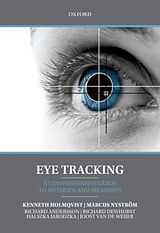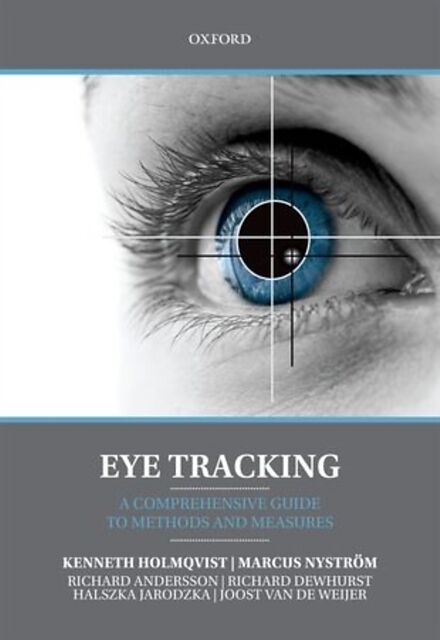Eye Tracking
Einband:
Fester Einband
EAN:
9780199697083
Untertitel:
A comprehensive guide to methods and measures
Genre:
Medizin
Autor:
Kenneth Holmqvist, Marcus Nyström, Richard Andersson, Richard Dewhurst, Halszka Jarodzka, Joost van de Weijer
Herausgeber:
Oxford University Press
Anzahl Seiten:
560
Erscheinungsdatum:
22.09.2011
ISBN:
978-0-19-969708-3
Zusatztext This practical book discusses both theoretical concepts and experimental design, showing how data samples can be converted into meaningful representations (i.e. fixations and saccades) using various algorithms. This is a reference that should be in the library of researchers in this field. Informationen zum Autor Kenneth Holmqvist is an associate professor in Cognitive Science at Lund university, where he founded the eye-tracking laboratory in 1995, which later grew into the large Humanities Laboratory. He has worked in a large variety of eye-tracking-based research stretching from reading research and scene perception, over to newspaper reading, advertisement studies and gesture recognition in face-to-face interaction. Kenneth also has expertise in eye tracking used in applied areas, including decision making in supermarkets and research on safety in car driving and air traffic control. In 2000, Kenneth initiated regular master courses in eye-tracking methodology. In 2006, he founded the Scandinavian Conference on Applied Eye-tracking, and in 2008, the international LETA training courses in eye-tracking methodology. Kenneth is the initiator and main author of this book.Marcus Nyström received his PhD in Information Theory from the department of Electrical and Information Technology at Lund University, Sweden, in 2008, working with foveated video compression and scene perception. He currently works in the Humanities Laboratory at Lund University. His research interests span eye-tracking methodology in general and analysis of eye-tracking data in particular.Richard Andersson is a PhD student in cognitive science and technician at the Lund University Humanities Laboratory. He teaches eye-tracking methodology and provides users with help during the formulation, building and analysis stage of the eye-tracking experiments. His research concerns the use of visual information in real-world language processing situations.Richard Dewhurst is presently a post-doctoral researcher at Lund University Humanities Laboratory, funded by the Swedish Research Council. He completed his PhD on training eye movements at the University of Nottingham in 2009, as part of the Cognition and Language research group. Prior to this he also obtained an MSc in psychological research methods from the University of Nottingham, and a BSc in psychology from the University of Wales, Bangor. His research focuses on attentional mechanisms and eye movements. More specifically how eye movement control changes with learning and experience, and how to devise and implement procedures for improving visual skills through training eye movements.Halszka Jarodzka works as an assistant professor at the Centre for Learning Sciences and Technologies at the Open University of the Netherlands. She holds a Master degree in Psychology and a PhD from the Knowledge Media Research Center, both at the Eberhard-Karls University of Tuebingen, Germany. Halszka's research focuses on the use of eye-tracking and verbal protocols in educational psychology, in particular investigating characteristics of visual expertise with expertise difference studies as well as teaching of biological classi?cation or medical diagnosis based on visual observation and interpretation of dynamic scenes by means of eye movement modelling examples.Joost van de Weijer defended his PhD thesis at the Max Planck Institute for Psycholinguistics in 1998. Thereafter he worked as a postdoc researcher at Johns Hopkins University, Baltimore, and at the Department of Linguistics and Phonetics in Lund. Currently, he is affiliated with the Centre for Languages and Literature and at the Humanities Laboratory, both at Lund University. Klappentext Eye movements are crucial in helping to deal with the vast amounts of information we encounter in our everyday lives. This book is a comprehensive handbook of eye tracking methodology. It describes how to evaluate and acquire an eye-...
Autorentext
Kenneth Holmqvist is an associate professor in Cognitive Science at Lund university, where he founded the eye-tracking laboratory in 1995, which later grew into the large Humanities Laboratory. He has worked in a large variety of eye-tracking-based research stretching from reading research and scene perception, over to newspaper reading, advertisement studies and gesture recognition in face-to-face interaction. Kenneth also has expertise in eye tracking used in applied areas, including decision making in supermarkets and research on safety in car driving and air traffic control. In 2000, Kenneth initiated regular master courses in eye-tracking methodology. In 2006, he founded the Scandinavian Conference on Applied Eye-tracking, and in 2008, the international LETA training courses in eye-tracking methodology. Kenneth is the initiator and main author of this book. Marcus Nyström received his PhD in Information Theory from the department of Electrical and Information Technology at Lund University, Sweden, in 2008, working with foveated video compression and scene perception. He currently works in the Humanities Laboratory at Lund University. His research interests span eye-tracking methodology in general and analysis of eye-tracking data in particular. Richard Andersson is a PhD student in cognitive science and technician at the Lund University Humanities Laboratory. He teaches eye-tracking methodology and provides users with help during the formulation, building and analysis stage of the eye-tracking experiments. His research concerns the use of visual information in real-world language processing situations. Richard Dewhurst is presently a post-doctoral researcher at Lund University Humanities Laboratory, funded by the Swedish Research Council. He completed his PhD on training eye movements at the University of Nottingham in 2009, as part of the Cognition and Language research group. Prior to this he also obtained an MSc in psychological research methods from the University of Nottingham, and a BSc in psychology from the University of Wales, Bangor. His research focuses on attentional mechanisms and eye movements. More specifically how eye movement control changes with learning and experience, and how to devise and implement procedures for improving visual skills through training eye movements. Halszka Jarodzka works as an assistant professor at the Centre for Learning Sciences and Technologies at the Open University of the Netherlands. She holds a Master degree in Psychology and a PhD from the Knowledge Media Research Center, both at the Eberhard-Karls University of Tuebingen, Germany. Halszka's research focuses on the use of eye-tracking and verbal protocols in educational psychology, in particular investigating characteristics of visual expertise with expertise difference studies as well as teaching of biological classi?cation or medical diagnosis based on visual observation and interpretation of dynamic scenes by means of eye movement modelling examples. Joost van de Weijer defended his PhD thesis at the Max Planck Institute for Psycholinguistics in 1998. Thereafter he worked as a postdoc researcher at Johns Hopkins University, Baltimore, and at the Department of Linguistics and Phonetics in Lund. Currently, he is affiliated with the Centre for Languages and Literature and at the Humanities Laboratory, both at Lund University.
Klappentext
Eye movements are crucial in helping to deal with the vast amounts of information we encounter in our everyday lives. This book is a comprehensive handbook of eye tracking methodology. It describes how to evaluate and acquire an eye-tracker, how to plan and design a study, and how to record and analyse eye-movement data
Inhalt
1: Introduction
Technical and Methodological Skills
2: Eye-tracking hardware and its properties
3: From vague idea to experimental design
4: Dat…

Leider konnten wir für diesen Artikel keine Preise ermitteln ...
billigbuch.ch sucht jetzt für Sie die besten Angebote ...
Die aktuellen Verkaufspreise von 6 Onlineshops werden in Realtime abgefragt.
Sie können das gewünschte Produkt anschliessend direkt beim Anbieter Ihrer Wahl bestellen.
Loading...
Die aktuellen Verkaufspreise von 6 Onlineshops werden in Realtime abgefragt.
Sie können das gewünschte Produkt anschliessend direkt beim Anbieter Ihrer Wahl bestellen.
| # | Onlineshop | Preis CHF | Versand CHF | Total CHF | ||
|---|---|---|---|---|---|---|
| 1 | Seller | 0.00 | 0.00 | 0.00 |
